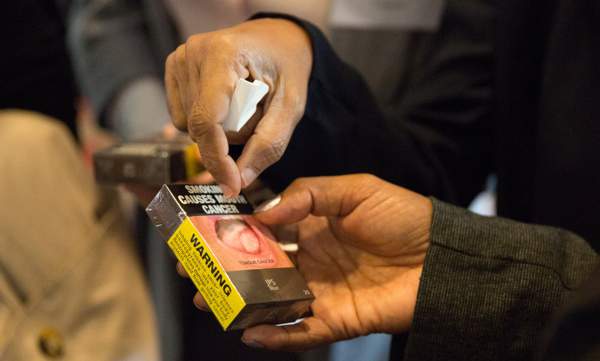.
When the World Trade Organization (WTO) Appellate Body ruled in favour of Australia’s world-first tobacco plain packaging laws last June, it ended a decade-long legal battle with the tobacco industry.
In its ruling, the Appellate Body made clear that Australia’s plain packaging laws do not violate international trade or intellectual property laws.
But what does this win for Australia’s laws mean for other countries that want to pursue plain packaging? And what about low- and middle-income countries who may be intimidated by the long and expensive legal battle Australia faced?
We asked Rachel Kitonyo Devotsu, the McCabe Centre’s Regional Manager for Africa and winner of a 2020 World No Tobacco Day Award.
Q: First off, what does the WTO Appellate body ruling mean for Australia?
For Australia, it’s the end of a long and difficult road.
Australia was the first country out of the gate in 2011 when it passed legislation requiring tobacco products be sold in drab, dark brown packaging without designs or logos. Legal challenges started almost immediately through multiple courts and tribunals.
But Australia beat every challenge, and smoking rates in the country continued to drop. And last year’s Appellate Body ruling is the final word, as no other legal challenges are possible.
Q: At least 15 other countries have now also passed plain packaging laws. But a lot of other countries have been waiting to see what happened with Australia. What are the implications for them?
Tobacco companies have long threated legal action against any country that even considered plain packaging. That threat has caused some regulatory chill for countries unwilling or unable to take on the industry. But this ruling shows that the threat is a myth.
Though the ruling does not stop the tobacco industry from challenging any other country’s plain packaging measures, it makes clear that plain packaging laws that are non-discriminatory do not contravene international trade or intellectual property laws. This should give other countries confidence that if their plain packaging laws are challenged, they will win.
This should give other countries confidence that if their plain packaging laws are challenged, they will win.
Q: Australia’s legal battle with the tobacco industry took nearly a decade. What about low- and middle-income countries who can’t invest that kind of time and money?
The beauty of Australia being forced to fight the tobacco industry for the past decade is that other countries probably won’t have to do as much work as they did.
For one thing, Australia has been able to gather a lot of evidence about how effective plain packaging is that other countries can borrow from. We saw this play out already when Philip Morris challenged Uruguay’s tobacco control measures, which require large graphic health warnings on tobacco packages and ban brand variants. The tribunal ruled that Uruguay – which did not conduct local studies – could rely on evidence from other countries, as well as from internal tobacco industry documents and the WHO Framework Convention on Tobacco Control (FCTC) and its guidelines.
With regard to the costs of defending these kinds of challenges, we can also learn from Uruguay’s case. The tribunal ordered Phillip Morris to pay 70% of Uruguay’s legal costs as well as the costs of the tribunal, while part of the remaining 30% was supported by the Anti-Tobacco Trade Litigation Fund, which is available to low- and middle- income countries to defend their tobacco control laws from tobacco industry challenges.
 Australia's plain packaging laws were passed in 2011.
Australia's plain packaging laws were passed in 2011.
Q. The tobacco industry often argues it’s not the right time for plain packaging, or that some less drastic measure should be taken instead. What do previous legal cases tell us about this argument?
In challenging plain packaging laws, tobacco companies have historically pointed to other measures that should be taken before plain packaging, like raising tobacco taxes and increasing public education campaigns.
The two cases from Australia and Uruguay make clear that WHO FCTC measures are complementary, working together instead of as alternatives. A country does not need to isolate the impact of an individual measure when other tobacco control measures are also in place.
So while it’s not a question of one measure versus another, countries can pre-empt the tobacco industry argument that they haven’t done everything they can by ensuring they have other tobacco control measures in place that are robust and in line with the WHO FCTC.
Q: What else can countries do when implementing plain packaging to protect against potential legal challenges?
Make sure you clearly define the objectives of your plain packaging laws in a way that can be monitored and linked to the evidence. The objectives should not solely be about reducing smoking rates but more broadly reducing demand for tobacco products and encouraging quitting by reducing the attractiveness of tobacco products, eliminating the effects of tobacco packaging as advertising, increasing the effectiveness of graphic health warnings, and reducing misleading packaging and labelling.
Make sure you clearly define the objectives of your plain packaging laws in a way that can be monitored and linked to the evidence.
The legislation should also reference the country’s intention to honour its obligations under the WHO FCTC. In both Australia and Uruguay’s cases, the WHO and the WHO FCTC Secretariat filed an amicus brief explaining how these measures helped the respective countries fulfil their obligations under the treaty.
A whole-of-government approach is also really important, all the way from the beginning, to make sure the measure is robust and covers all bases. Agencies to be included in the design, implementation, enforcement and evaluation of the legislation include those responsible for health, legal affairs, foreign affairs, trade and investment and intellectual property.
Q: Given Australia’s victory for plain packaging, what would you say to other countries wanting to follow suit?
If your plain packaging law has a strong evidence base, has been drafted to apply in a non-discriminatory manner, and you already have other strong tobacco control measures in place, then I would say go for it.
For every tobacco control measure that has been challenged, so long as these other areas have been dealt with, governments have won. Challenging is par for the course. The tobacco industry challenges not because they think they’ll win, but because they can afford it and they want to scare countries from regulating them.
The Appellate Body ruling reinforces that the protection of public health is recognised as highly important in international trade law. There will be very few courts that will want to strike down a public health measure that is not discriminatory and has proven to help reduce the health burden of tobacco.
So I would say, if you have your ducks in order, go right ahead. If everyone is sitting around waiting for someone else to do it, then nothing gets done.
***
More resources on legal challenges to tobacco control measure are available at the WHO FCTC Knowledge Hub on Legal Challenges website and through Cancer Council Victoria's Plain Facts website.
Subscribe to updates to learn more about the McCabe Centre's work supporting tobacco plain packaging, and other effective tobacco control measures.